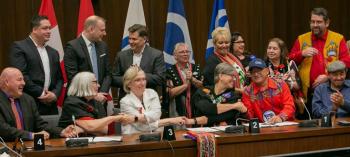Image Caption
Summary
Local Journalism Initiative Reporter
Windspeaker.com
It’s a “very exciting time” to be Métis in Canada and in Ontario, says Métis Nation of Ontario President Margaret Froh.
With Métis self-government on the horizon, the number of Métis in Ontario registering their citizenship with the MNO is increasing, she says.
People “want to be a part of Métis history, as well as access the variety of services we offer which will only continue to grow and expand as we move forward, especially under self-government,” said Froh in an exclusive interview with Windspeaker.com.
In 2019, the MNO signed a Métis Government Recognition and Self-Government Agreement with Canada. It outlines steps that need to be taken in order for the federal government to recognize the inherent rights to self-government held by the Métis communities represented by the MNO and to authorize the MNO to implement those rights on behalf of those communities.
Similar agreements were signed by the federal government with Métis Nations in Alberta and Saskatchewan.
In 2017, the MNO and Ontario government announced there were seven “historic Métis communities in the province that meet the Powley test criteria.” Powley is the name of the defendants in a pivotal Métis hunting rights Supreme Court of Canada decision. The court established a set of criteria that Métis must meet to have those hunting rights.
“We represent Métis who tie historically to historic Ontario Métis communities, like the Powley community (in Sault Ste. Marie) and we also represent Métis who tie to the Métis Nation homeland west of Ontario,” said Froh.
MNO’s most recent registry numbers sit at about 28,000 citizens.
“The new Métis Government will have recognized law-making powers in the areas of citizenship, leadership selection, and internal operations. The Self-Government Agreement ‘locked in’ these steps, so they cannot be swept away by changing political winds or circumstances. In this way, the Self-Government Agreement ‘sets the table’ for the next steps that the MNO will take to implement the agreement,” reads the MNO website.
Moving forward with the meetings necessary to take these next steps has been impacted by the coronavirus, says Froh, noting that public gatherings were banned in early 2020 as a means to fight COVID-19. That made it difficult—but not impossible—to reach out to regional and local leadership.
“One of the biggest things we have to do is we have to build our constitution…through dialogue with the citizens across the province working from the ground up,” said Froh.
The constitution will address such issues as who the Métis are, the governance structure, how to elect leadership and how to resolve conflict.
Now that most COVID restrictions have been dialed back or lifted, Froh said they will move forward with a “deep level of engagement…in order to hear from the people around what they want to see in terms of our Métis government 30, 50, 70 years into the future. That’s a really exciting process. It’s really engaging people.”
She adds that interest is coming from both the youth and the Elders.
While this bigger work is taking place, the MNO is also working on polices. Two of its newer polices work to ensure that MNO resources, programs, services and appointments go where they’re supposed to go.
“Our concern is that when we negotiate benefits on behalf of rights-bearing Métis people that they go to rights-bearing Métis people and we’re dealing with that,” said Froh.
The Eligibility for Direct Benefit Programs and Services policy now requires a complete MNO citizenship file status to qualify. These programs and services include early learning and childcare programs, post-secondary education, MNO COVID help programs, home improvement and housing stabilization.
The MNO is also tackling the issue of people claiming to be Métis and benefitting from post-secondary appointments. Those false claims have come to the forefront in the past year or so.
The MNO has adopted a Verification of MNO Citizenship File Status to Other Governments and Third-Party Institutions policy. It provides a mechanism for a government or third-party institution (such as a university) to verify the citizenship file status of an MNO citizen applying to receive an award, benefit or recognition, where proof that an individual is a Métis rights-holder is a factor in the decision.
Froh says that such verification only works if an Ontario Métis is on the MNO’s registry list. However, not being on that list doesn’t mean someone isn’t Métis.
“Then it’s just a bit more challenging for you to be able to demonstrate with any institution,” she pointed out.
The Congress of Aboriginal Peoples also represents Métis, along with off-reserve status and non-status First Nations, as well as southern Inuit.
Local Journalism Initiative Reporters are supported by a financial contribution made by the Government of Canada.

